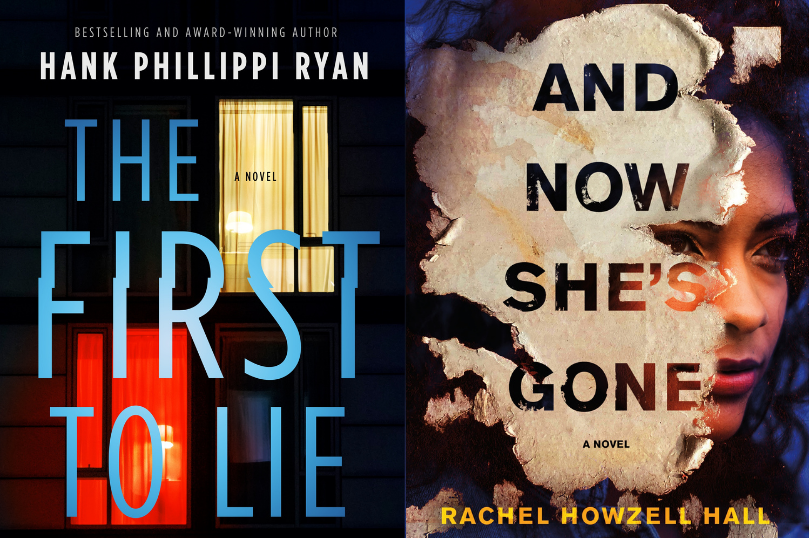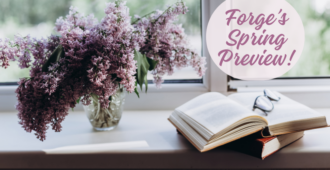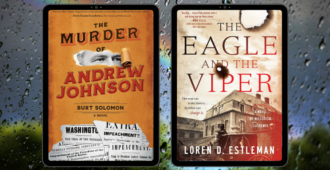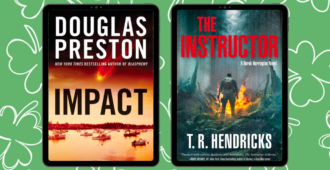Forge authors Hank Phillippi Ryan and Rachel Howzell Hall both have new books out this year, so we got them together to chat about writing characters who keep secrets, guessing plot twists, and more!
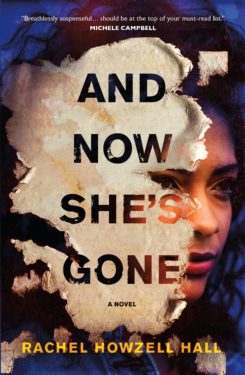 Both of your books feature women pretending to be someone they’re not — why were you drawn to write about them? Do you have personal experience with pretending to be someone else, or projecting a different image?
Both of your books feature women pretending to be someone they’re not — why were you drawn to write about them? Do you have personal experience with pretending to be someone else, or projecting a different image?
HANK:Oh. Daily. (Laughing.) But I have been a television reporter for more than 40 years. I’ve wired myself with hidden cameras, and gone undercover and in disguise. It’s very stressful, and I’ve learned that the only way to be successful is to have most of yourself convinced that you really are who you say you are–is that method acting? And only keep a tiny sliver of your brain free to remember your real goals. That way your behavior and reactions seem authentic. Still, there’s always that one track of your brain that’s thinking: did I get a wide shot? Did I get a shot of his face? Is my camera working? What will I say if I get caught?
(I’ve only gotten caught once. My “hidden” camera was not hidden well enough, and that’s not good. But it all worked out fine.)
RACHEL: Nothing as exciting and as fascinating as Hank, ohmigod. But as a woman, I’ve pretended plenty throughout my fifty years–that I’m more brave than I am, dumber than I look, a wanton seductress and an intellect that surrounds herself in books. It depended on the situation, of course, but playacting is something I think we all have done. I’ve also seen up close women who leave fabulous public lives–friends, successful jobs, bubbly and vibrant personalities–go home to a mess and a family life in tatters. They’re being abused–or act as abusers. Toxic and raggedy, but no one expects that that woman’s being hit? Or that woman’s cursing like a sailor and is mean as a snake? No, because she and the kids roll out the next morning with fresh clothes, forced smiles, and for her, makeup hiding the bruises or perfume hiding the stench of brimstone.
And last, as an African American woman, (and I’ve talked about this plenty), I’ve pretended that I didn’t hear the racist comment, or that I’m fine with the phrase, “I don’t see color,” a phrase that I absolutely hate because nothing is wrong with me being black and by not seeing that, you fail to recognize that my color has influenced and shaped everything about me. That’s like saying, I don’t see food types. Tacos are wonderful. So is roast beef. So is spaghetti. There’s nothing wrong saying, “I love Mexican food.” End rant.
Which comes first when you’re writing these complicated characters – the real character or their pretend identity?
HANK: The real character. Then I think: What does she want, and how far will she go to get it? Because when a book feels real, 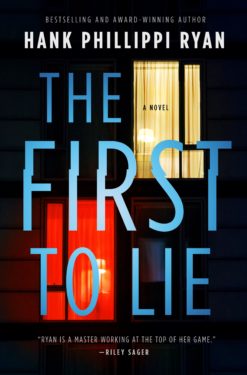 like the character is a real person–they do things for a reason. So in THE FIRST TO LIE, I knew that at least one character had a driving, obsessive, and understandable motivation for her desire for revenge. Then, understanding that, I had to figure out how she’d accomplish her goal successfully.
like the character is a real person–they do things for a reason. So in THE FIRST TO LIE, I knew that at least one character had a driving, obsessive, and understandable motivation for her desire for revenge. Then, understanding that, I had to figure out how she’d accomplish her goal successfully.
RACHEL: With AND NOW SHE’S GONE, I think the character came first. Because I’ve seen women in jeopardy, women who want to leave, and they do, only to be pulled back. I wanted to see that in a book but this time, I want her to actually get away… but not really. And like Hank, I also wanted to write about how far a character will go to get it–but with two women. One who has successfully managed the trick of disappearing and the one who is tasked with finding her.
What is compelling about writing about people with secrets? What about you, can you reveal any of your own secrets/what do people not know about you, or what do they think about you that is dead wrong?
HANK: Every thriller is about secrets–who has a secret, and what it is, and who else knows it–and what will happen if the secret is revealed. And what will the character do to protect that bit of knowledge? That’s truly the fun part of writing–sometimes my characters reveal secrets that even I didn’t know they had! “The first line of the first chapter of THE FIRST TO LIE” is “Lies have a complicated half-life.” Because it’s not only about concocting the lie, and telling the lie, but remembering it.
Secrets about me? Do I even have any? Ah–I’m a terrible singer? But I know all the words to the Beatles songs, and endless Broadway musicals? That I wanted to be a disc jockey when I grew up? And oh–I am the world’s worst driver. The worst. I was a majorette in high school–!!–but I was so terrible, the band director told me to march in the middle of the back row, and just pretend to twirl. What do people think that’s dead wrong? Ah–maybe that I’m super-confident. Trust me, I am terrified with nerves at every appearance.
RACHEL: I refuse to believe that Hank is terrified EVER — okay, maybe when she was caught undercover but other than that? Bah.
Big secrets are exhausting–anyone who keeps them is constantly thinking about them. Holding their breath anytime a subject comes up. Keeping secrets is a mental thing but it’s incredibly visceral. And that makes for exciting writing. And we all relate to these stories because we’ve all kept secrets–not necessarily embarrassing, life-changing ones but secrets nonetheless. From love and loyalty to actually hating that movie or not knowing the words of the Black National Anthem, people have things they’ll hold to their chests until they die.
Those who don’t know me assume that I’ve always led a quiet, middle-class life filled with books and videogames. Books and videogames, yes. But I’ve seen violence up close, gunshots all around me. I’ve had more than six surgeries and my drawers are filled with the nice, treaded socks hospitals slip on your feet before procedures. I have secrets and they fuel my writing. One funny secret that I’ll share: when I was in 7th grade, my mom picked me up from school. I needed to pee really, really bad but she needed me to go into the drug store for something. I protested but I had to go–and so I went into that Sav-on. And I peed in the aisle. And ran out, not telling the manager that I peed in Aisle 7.
What did you find surprising in your writing process?
HANK: I have no idea about the endings of the books. Or, for that matter, the middles. I have no idea what comes next until the next sentence, and the next paragraph, and then, whoa the next scene. SO people say wow, the ending of THE FIRST TO LIE really surprised me! And I say, yeah, wasn’t that a surprise? Talk about a surprise ending. I surprise myself. Every time! But that’s what gets me to the computer every day–I have to find out what happens next. And the only way to do that is to write it.
I must say–I do not recommend this method.
RACHEL: But you do it so well, Hank!
I’m surprised that it continues to be hard. That I continue to be scared–of writing a complete story that makes sense, that makes a reader want to turn the page. I guess that’s a secret–that I fear that I’m no good at this and that I’ll never become the Beyonce of Hank Phillippi Ryans because I suck. LOL. My big secret, writing-related, is that I’m scared to death that I will never be successful. So, it’s a big thrill when someone reads my books, or when I’m nominated for an award. Part of me thinks that happens out of pity or because someone is being nice to me. On my most confident days–Monday through Wednesday–I know that’s not true. I know that I have interesting stories to tell, that it’s fine that my voice is different than Hank’s or Attica’s or Steph’s, that this isn’t a zero sum game and that my stories deserve a place on a bookshelf somewhere. I keep writing in hopes that I will someday get it right.
Hank, do you have a bank of endings that you haven’t used and that you aim to use one day? I have, like, two or three…
HANK: Ha. Ha ha ha. Rachel, you are a funny funny person. I have NO spare endings. I don’t even have the ending I need for the book I’m working on now. (And aw, Rachel. Thank you.) But wait. Rachel. You KNOW the endings of your books before you start? Do you know the whole story?
RACHEL: As a child of pop culture, growing up in the 80s, television as your babysitter, I love good endings–and the best endings for me were always from The Twilight Zone. There was always something special on holidays because of the TZ marathons, and we’d watch all day and the endings still resonated even though you’ve watched that ‘Anthony sending people to the cornfield’ episode 100 times. So, that desire to leave readers with a good ending–not one of those ‘gotcha’ ones but a very lovely, organic end to things… Yes, sometimes I do know the endings, although Land of Shadows–I didn’t know that ending until I wrote it. The ending for And Now She’s Gone, I did know. But I didn’t know the whole story.
You’ve both written series and are now writing stand-alones – what drew you to these stand-alone stories? Were there plots that didn’t fit with your series that you have adapted into stand-alones?
HANK: So different to write a series and a standalone. Because in a series, the main character isn’t going to die–Jane Ryland will be back! So the suspense has to come from something other than the mortality of the main character. So there’s a crime, it’s solved, and you can go on to the next adventure. But in a standalone there’s this amazing knowledge that anything can happen. Anyone can be good, anyone can be bad, anyone can be guilty, and anyone–anyone!–can die. When I realized that, it felt so powerful.
So to me, a standalone means: here is the single biggest and most compellingly important thing that will ever happen to these people. And watch out readers–anything goes.
RACHEL: Writing mystery and crime, we’re blessed (or cursed) with an abundance of story ideas. And I want to get to at least thirty percent of those. I can’t really do that if I’m solely writing a series. I want to hop in different characters’ heads–Lou Norton is different than Miriam Macy, and Grayson Sykes and Isabel Lincoln are different than Lou and Miriam. Of course, I could’ve Rube Goldberged plots to fit into a Lou Norton story or a missing woman plotline, but I didn’t want to do that. I wanted each woman to have a say and to be featured and to have her life examined.
Hank, since you’re an investigative reporter, are there too many stories vying for attention. “Write me! Write me!’ How do you narrow down what you wanna write?
HANK: I have often said to my husband on my writing days: If I can have just ONE good idea a day, I’m happy. One! But that elusive gorgeous idea for a novel? That’s such a great question, Rachel. I have this weird faith or trust or belief that when I need a good idea, it will come. But that is the most difficult part of writing–to get that one gorgeous core gem of an idea. I absolutely remember when it happened for THE FIRST TO LIE. But if I reveal it, it will give it all away.
But Rachel, you honestly have an abundance of ideas? Sigh. Does your writer-brain just decide: This is the one? Or is it a theme?
RACHEL: I do! I have about ten stories that I’ve started and stopped, simply because I don’t know how to write them yet. And I have an Evernote filled with news articles of future stories. I only decide which ones to write only when I can’t stop writing it, when I’m not frustrated or bored by it. I do know that I have to be excited about the idea–and that I’m clear on what I want to say about that issue. It took me more than ten years to figure out the story that eventually became And Now She’s Gone.
Are either of you good at guessing other people’s twist endings?
HANK: Ha! I constantly guess. My husband and I will be watching TV, and I’ll say–The sister did it! Or–she’s pregnant. Or–oh, it’s the daughter. And Jonathan asks–can’t you just watch it? And I say–no, I can’t. I have to guess.
But here’s what’s a little annoying. If we’re told there’s a twist, then we’re looking for it. And reading every single word looking for clues. And sometimes, instead of enjoying the book, our brains race ahead, trying to beat the author to the answer. I wish I could stop doing that. Maybe we should even stop saying that books have twist endings. Just let ‘em be a surprise.
RACHEL: Amen, Hank! I’m already looking for the trick, and with the ‘with the ending you don’t wanna miss,’ I can’t just enjoy the story. As a writer, I like starting simple and have the reader look up and realize that they’ve been caught up in a delicious tangle. I hate twist endings for the sake of twist endings. I think after The Sixth Sense, everyone had to have these crazy contortions in their stories. I think life in itself offers enough twists without having the ‘he was always dead’ ending. I mean, who would’ve guessed 2020 would shape up (or down) like it has? I’m hoping for a twist ending, though. The good kind, though.
HANK: Agreed, dear Rachel.
Preorder And Now She’s Gone, coming September 22, 2020!
Order a copy of The First to Lie, now on sale!

